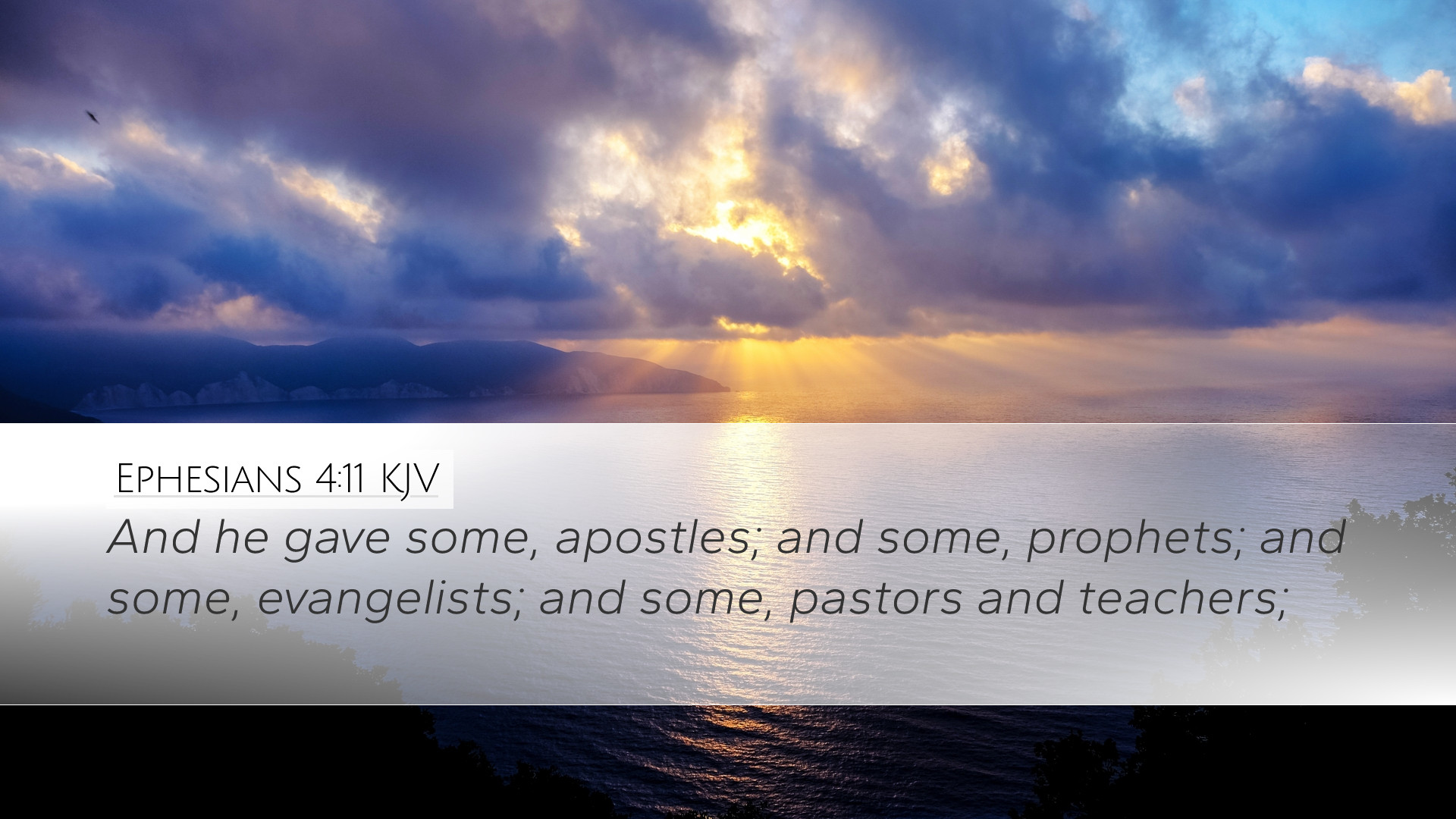Ephesians 4:11 - Commentary Summary
Text of Ephesians 4:11 (KJV): "And he gave some, apostles; and some, prophets; and some, evangelists; and some, pastors and teachers;"
Introduction
The verse Ephesians 4:11 is pivotal in understanding the structure and function of the Church in the New Testament. It highlights the roles that Christ has given to His followers for the purpose of building up the body of Christ.
Contextual Background
In the broader context of Ephesians 4, Paul is addressing unity and diversity within the Body of Christ. After emphasizing the importance of maintaining unity in the Spirit (Ephesians 4:3), Paul outlines the various gifts given by Christ, emphasizing that these roles are vital for the maturity and growth of the Church.
Commentary Insights
The Giver of the Gifts
The verse begins with "And he gave," underscoring the divine initiative in distributing these gifts. According to Matthew Henry, the giver is Christ who ascended on high, demonstrating His authority to appoint these roles. This suggests that these gifts are not merely human inventions but divinely ordained responsibilities.
The Roles Defined
- Apostles: The foundational leaders of the early Church, tasked with spreading the Gospel and establishing churches. Albert Barnes states that the apostles were those who had seen the risen Christ and were directly appointed by Him.
- Prophets: Those who proclaim God’s message, bringing forth revelation and guidance to the Church. Adam Clarke notes that prophets were vital in conveying divine messages and ensuring that God’s will was made known among His people.
- Evangelists: Preachers of the Gospel, specifically tasked with spreading the good news of Christ to those outside the faith. Barnes emphasizes their role in missions and evangelism, highlighting their importance in the growth of the Church.
- Pastors and Teachers: Shepherds who guide and instruct the local church in spiritual matters. Henry points out that pastors are essentially shepherds, tasked with caring for the flock, while teachers focus on instructing and nurturing believers in doctrine.
Interconnectedness of Roles
Each of these roles serves a distinct purpose, yet they are meant to work in harmony. Adam Clarke comments on the importance of unity in diversity, indicating that while each role has its responsibilities, they all contribute to the common goal of edifying the body of believers.
The Purpose of the Gifts
Paul’s listing of these roles implies a hierarchical structure but emphasizes their purpose. Ephesians 4:12 clarifies that these gifts are for the "perfecting of the saints, for the work of the ministry, for the edifying of the body of Christ." Matthew Henry notes that the intention of these roles is not self-aggrandizement but for the building up of the Church and equipping believers for ministry.
Spiritual Maturity
The roles mentioned in Ephesians 4:11 are vital for fostering spiritual maturity among believers. Albert Barnes writes that without these leaders, the Church would struggle to remain steadfast in faith and doctrine. It is through their guidance that Christians attain unity in faith and knowledge of Christ.
Contemporary Implications
In today’s church context, understanding these roles is crucial. Henry suggests that churches must identify and empower individuals who exhibit these gifts to fulfill God’s plan effectively. This not only ensures proper spiritual care but also leads to a more vibrant and effective church community.
Conclusion
Ephesians 4:11 serves as a reminder of Christ’s care for His Church through the provision of gifted individuals. Each role, from apostles to teachers, plays an integral part in the spiritual journey and growth of the Church. As students, pastors, and theologians study this passage, may they recognize the importance of these roles and the necessity of fostering a spirit of cooperation and unity among believers.


